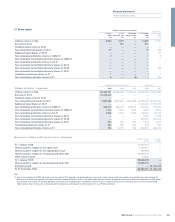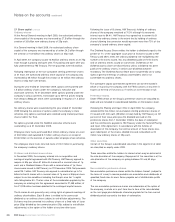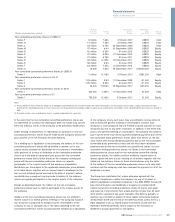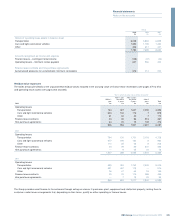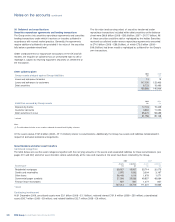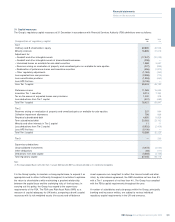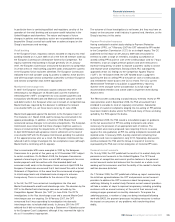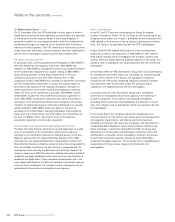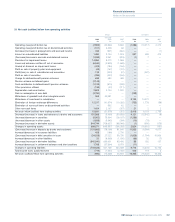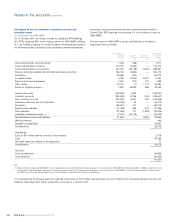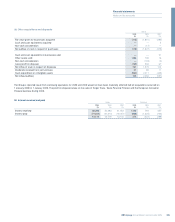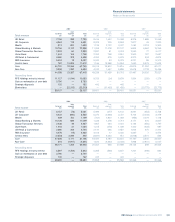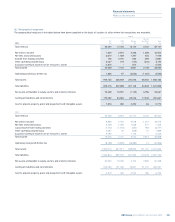RBS 2009 Annual Report Download - page 337
Download and view the complete annual report
Please find page 337 of the 2009 RBS annual report below. You can navigate through the pages in the report by either clicking on the pages listed below, or by using the keyword search tool below to find specific information within the annual report.
335RBS Group Annual Report and Accounts 2009
Financial statements
Notes on the accounts
In particular there is continuing political and regulatory scrutiny of the
operation of the retail banking and consumer credit industries in the
United Kingdom and elsewhere. The nature and impact of future
changes in policies and regulatory action are not predictable and are
beyond the Group’s control but could have an adverse impact on the
Group’s businesses and earnings.
Retail banking
In the European Union, regulatory actions included an inquiry into retail
banking initiated on 13 June 2005 in all of the then 25 member states by
the European Commission’s Directorate General for Competition. The
inquiry examined retail banking in Europe generally. On 31 January
2007, the European Commission announced that barriers to competition
in certain areas of retail banking, payment cards and payment systems
in the European Union had been identified. The European Commission
indicated that it will consider using its powers to address these barriers
and will encourage national competition authorities to enforce European
and national competition laws where appropriate.
Multilateral interchange fees
In 2007, the European Commission issued a decision that while
interchange is not illegal per se, MasterCard’s current multilateral
interchange fee (“MIF”) arrangement for cross border payment card
transactions with MasterCard and Maestro branded consumer credit
and debit cards in the European Union are in breach of competition law.
MasterCard was required by the decision to withdraw the relevant
cross-border MIFs (i.e. set these fees to zero) by 21 June 2008.
MasterCard appealed against the decision to the European Court of
First Instance on 1 March 2008, and the Group has intervened in the
appeal proceedings. In addition, in Summer 2008, MasterCard
announced various changes to its scheme arrangements. The European
Commission was concerned that these changes might be used as a
means of circumventing the requirements of the infringement decision.
In April 2009 MasterCard agreed an interim settlement on the level of
cross-border MIF with the European Commission pending the outcome
of the appeal process and, as a result, the European Commission has
advised it will no longer investigate the non-compliance issue (although
MasterCard is continuing with its appeal).
Visa’s cross-border MIFs were exempted in 2002 by the European
Commission for a period of five years up to 31 December 2007 subject
to certain conditions. On 26 March 2008, the European Commission
opened a formal inquiry into Visa’s current MIF arrangements for cross
border payment card transactions with Visa branded debit and
consumer credit cards in the European Union and on 6 April 2009 the
European Commission announced that it had issued Visa with a formal
Statement of Objections. At the same time Visa announced changes to
its interchange levels and introduced some changes to enhance
transparency. There is no deadline for the closure of the inquiry.
In the UK, the OFT has carried out investigations into Visa and
MasterCard domestic credit card interchange rates. The decision by the
OFT in the MasterCard interchange case was set aside by the
Competition Appeal Tribunal (the “CAT”) in June 2006. The OFT’s
investigations in the Visa interchange case and a second MasterCard
interchange case are ongoing. On 9 February 2007, the OFT
announced that it was expanding its investigation into domestic
interchange rates to include debit cards. In January 2010 the OFT
advised that it did not anticipate issuing a Statement of Objections prior
to the European Court’s judgment, although it has reserved the right to
do so if it considers it appropriate.
The outcome of these investigations is not known, but they may have an
impact on the consumer credit industry in general and, therefore, on the
Group’s business in this sector.
Payment Protection Insurance
Having conducted a market study relating to Payment Protection
Insurance (“PPI”), on 7 February 2007 the OFT referred the PPI market
to the Competition Commission (“CC”) for an in-depth inquiry. The CC
published its final report on 29 January 2009 and announced its
intention to order a range of remedies, including a prohibition on
actively selling PPI at point of sale of the credit product (and for 7 days
thereafter), a ban on single premium policies and other measures to
increase transparency (in order to improve customers’ ability to search
and improve price competition). Barclays Bank PLC subsequently
appealed certain CC findings to the Competition Appeal Tribunal
(“CAT”). On 16 October 2009, the CAT handed down a judgment
quashing the ban on selling PPI at the point of sale of credit products
and remitted the matter back to the CC for review. The CC’s current
Administrative Timetable is to publish a supplementary report by
Summer 2010 and give further consideration to its full range of
recommended remedies and a draft order to implement them during
Autumn 2010.
The FSA has been conducting a broad industry thematic review of PPI
sales practices and in September 2008, the FSA announced that it
intended to escalate its level of regulatory intervention. Substantial
numbers of customer complaints alleging the mis-selling of PPI policies
have been made to banks and to the FOS and many of these are being
upheld by the FOS against the banks.
In September 2009, the FSA issued a consultation paper on guidance
on the fair assessment of PPI mis-selling complaints and, where
necessary, the provision of an appropriate level of redress. The
consultation also covers proposed rules requiring firms to re-assess
(against the new guidance) all PPI mis-selling complaints received and
rejected since 14 January 2005. A policy statement containing final
guidance and rules is expected in early 2010. Separately, discussions
continue between the FSA and the Group in respect of concerns
expressed by the FSA over certain categories of historical PPI sales.
Personal current accounts
On 16 July 2008, the OFT published the results of its market study into
personal current accounts in the United Kingdom. The OFT found
evidence of competition and several positive features in the personal
current account market but believes that the market as a whole is not
working well for consumers and that the ability of the market to function
well has become distorted.
On 7 October 2009, the OFT published a follow-up report summarising
the initiatives agreed between the OFT and personal current account
providers to address the OFT’s concerns about transparency and
switching, following its market study. Personal current account providers
will take a number of steps to improve transparency, including providing
customers with an annual summary of the cost of their account and
making charges prominent on monthly statements. To improve the
switching process, a number of steps are being introduced following
work with BACS, the payment processor, including measures to reduce
the impact on consumers of any problems with transferring direct
debits.


